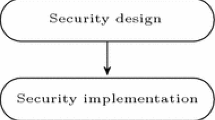Abstract
Mature information systems grow old disgracefully as successive waves of hacking result in accidental architectures which resist the reflection of ongoing business process change. Such petrified systems are termed legacy systems. Legacy systems are simultaneously business assets and business liabilities. Their hard-won dependability and accurate reflection of tacit business knowledge prevent us from undertaking green-field development of replacement systems. Their resistance to the reflection of business process change prevents us from retaining them. Consequently, we are drawn in this paper to a controlled pattern-oriented legacy system migration strategy. Legacy systems exhibit six undesirable anti-patterns. A legacy system migration strategy must focus upon the controlled elimination of these anti-patterns by the step-wise application of six corresponding desirable patterns. Adherence to this migration strategy results in adaptive systems reflecting purposeful architectures open to the ongoing reflection of business process change. Without such a strategy there is a very real danger that legacy system migration will occur all too literally. That is, the old legacy system will be migrated to a new legacy system albeit it one using the latest buzzword-compliant technology.
Access this chapter
Tax calculation will be finalised at checkout
Purchases are for personal use only
Preview
Unable to display preview. Download preview PDF.
Similar content being viewed by others
References
Brodie, M.L. and Stonebraker, M. (1995). Migrating Legacy Systems: Gateways, Interfaces, and the Incremental Approach. Morgan Kaufman.
Ehn, P. (1988). Work-oriented design of computer artifacts. PhD thesis, Almquist & Wiksell International, Stockholm.
Gamma, E., Helm, R., Johnson, R. and Vlissides, J. (1995a). Façade. In Gamma, E., Helm, R., Johnson, R. and Vlissides, J. (eds), Design Patterns: Elements of Reusable Object-Oriented Software. Addison-Wesley.
Gamma, E., Helm, R., Johnson, R. and Vlissides, J. (1995b). Observer. In Gamma, E., Helm, R., Johnson, R. and Vlissides, J. (eds), Design Patterns: Elements of Reusable Object-Oriented Software. Addison-Wesley.
Gamma, E., Helm, R., Johnson, R. and Vlissides, J. (1995c). Adapter. In Gamma, E., Helm, R., Johnson, R. and Vlissides, J. (eds), Design Patterns: Elements of Reusable Object-Oriented Software. Addison-Wesley.
Goldkuhl, G. (1996). Generic business frameworks and action modelling. In Proceedings of Language/Action Perspective ‘86. Springer-Verlag.
Goldkuhl, G. (1998). The six phases of business processes: communication and the exchange of value. In Proceedings of Twelfth Biennial ITS Conference, Stockholm.
Goldkuhl, G. and Röstlinger, A. (1993). Joint elicitation of problems: an important aspect of change analysis. In Proceedings of IFIP w.g. 8.2 Working Conference on Information Systems Development: Human, Social, and Organizational Aspects, Noordwijkerhout, Netherlands.
Goldkuhl, G., Lind, M. and Seigerroth, U. (1998). The language action perspective on communication modelling. In Proceedings of the Third International Workshop, Jonko** International Business School.
Harel, D. and Politi, M. (1998). Modeling Reaction Systems with Statecharts. McGraw-Hill.
Henning, M. and Vinoski, S. (1999). Advanced CORBA Programming with C++. Addison-Wesley.
Lauder, A. (1999). EventPorts. In PhDOOS Workshop, ECOOP ‘89, Lisbon.
Lauder, A. and Kent, S. (1999). EventPorts: flexible protocol reflection. Submitted to EDOC ‘89.
Lauder, A. and Lind, M. (1999). Legacy systems: assets or liabilities? Submitted to LAP ‘89, Copenhagen.
Morgan, G. (1996). Organizations as organisms. In Images of Organizations, Sage.
Riehle, D. (1996). The event notification pattern: integrating implicit invocation with object-orientation. Theory and Practice of Object Systems, 2, 1.
Schmidt, D. (1995). Reactor: an object behavioral pattern for concurrent event multiplexing and event handler dispatching. In Coplien, J.O. and Schmidt, D. (eds), Pattern Languages of Program Design. Addison-Wesley.
Schmidt, D. (1999). The ADAPTIVE communication environment, http://www.cs.wustLedu/~schmidt/
Senge, P.M. (1990). The Fifth Discipline: The Art and Practice of the Learning Organization. Doubleday.
SoftWired AG (1999). iBus, http://www.softwired-inc.com
Talarian (1999). SmartSockets, http://www.talarian.com
Tibco (1999). Rendezvous Information Bus, http://www.tibco.com
Uschold, M. and Gruninger, M. (1996). Ontologies: principles, methods, and applications. Knowledge Engineering Review, 11, 2.
Vlissides, J. (1997). Multicast. C++ Report, September. SIGS.
Editor information
Editors and Affiliations
Rights and permissions
Copyright information
© 2000 Springer-Verlag London
About this chapter
Cite this chapter
Lauder, A., Kent, S. (2000). Legacy System Anti-Patterns and a Pattern-Oriented Migration Response. In: Henderson, P. (eds) Systems Engineering for Business Process Change. Springer, London. https://doi.org/10.1007/978-1-4471-0457-5_19
Download citation
DOI: https://doi.org/10.1007/978-1-4471-0457-5_19
Publisher Name: Springer, London
Print ISBN: 978-1-4471-1146-7
Online ISBN: 978-1-4471-0457-5
eBook Packages: Springer Book Archive




